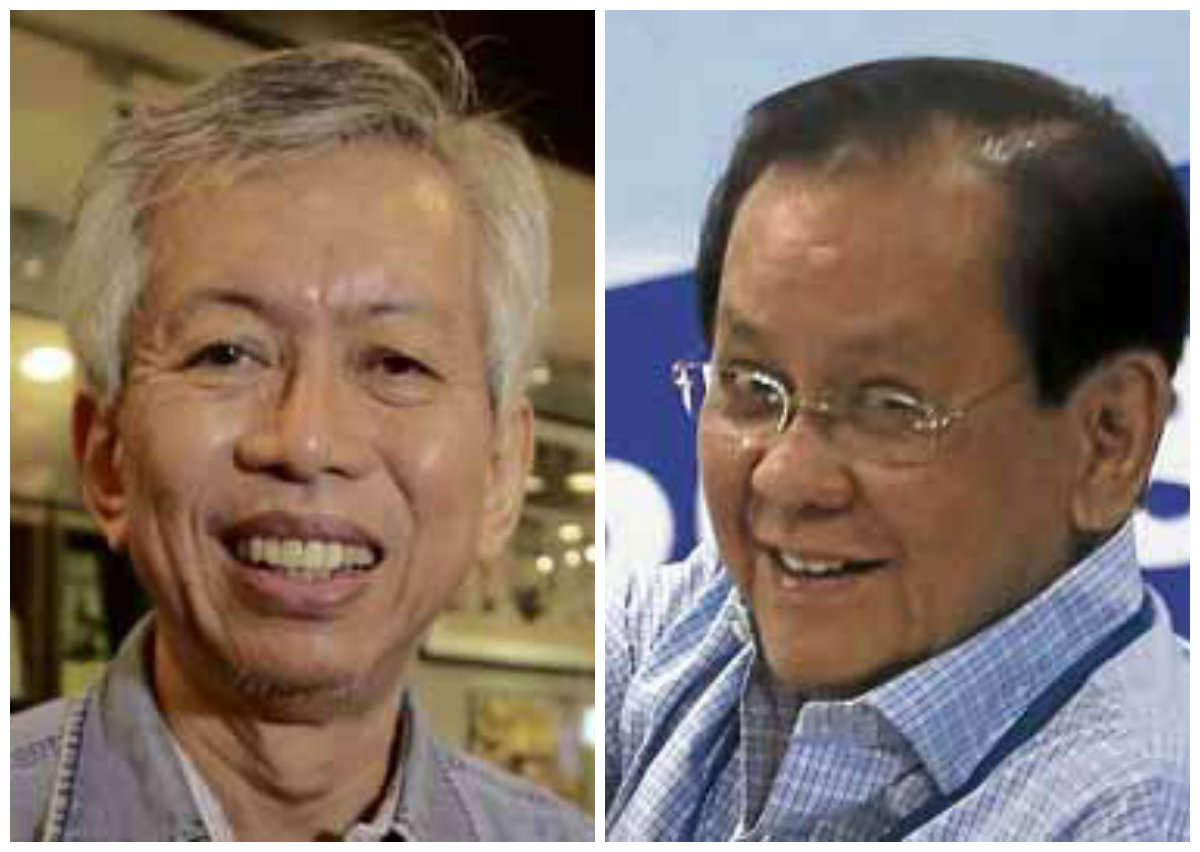
Jose F. Lacaba Jr. and Sergio Osmeña III
MANILA, Philippines — Two men who were jailed during the Marcos regime joined other martial law victims who trooped to the Commission on Human Rights (CHR) office on Friday to receive compensation checks from a class suit they won against the Marcos estate back in 1995.
Former Sen. Sergio Osmeña III, named after a political rival of the late dictator Ferdinand Marcos, received a check for P77,500 from human rights lawyer Robert Swift.
He deposited the check and wrote a new one for the same amount that he donated on Monday to the Free Legal Assistance Group, a pioneering legal defense group that dates back to the dark years of martial law and is currently led by Chel Diokno, dean for De La Salle University’s College of Law.
Screenwriter, journalist and poet Jose “Pete” F. Lacaba Jr., along with friend and fellow screenwriter Bonifacio Ilagan, also went to the CHR office but were told there were no checks under their names because they had been “delisted.”
Lacaba and Ilagan are among the more prominent survivors of the martial-law era in the 1970s, a period marked by human-rights violations as documented by Nobel laureate Amnesty International and other groups.
First Quarter Storm
In a display of goodwill, Lacaba approached Swift and gave the American lawyer a signed copy of his book “Days of Disquiet, Nights of Rage.”
The book is a celebrated compilation of Lacaba’s reportage of the First Quarter Storm — the 1970 protest movement that served as a key chapter in the country’s student activism but was also regarded, in hindsight, as the death knell signaling democracy’s demise in the postwar Third Republic.
Lacaba said in Filipino regarding Swift’s response to his gesture: “He didn’t mind me very much. He just nodded and set aside the book. Not a word.”
In a phone interview, Osmeña said the check he got on Friday was already the third given to victims of human rights abuses.
Third tranche
Earlier reports said the group Claimants 1081, led by the former human rights commission chair Loretta Ann Rosales, was involved in the distribution of the third tranche of checks.
The first tranche of $1,000 for each claimant (equivalent to P43,000) was given in 2011, and the second tranche of $1,000 each (or P50,000 then) was turned over in 2013.
Osmeña said he received his share of the first tranche, but he “forgot to pick up” his second.
He and his fellow detainee, media magnate Eugenio “Geny” Lopez Jr., made a daring escape in the 1970s that was later dramatized in film. After the escape, they went into exile in the United States and joined the anti-Marcos struggle there.
Regarding the political comeback of the Marcoses, Osmeña said, “We are trying to get apologies from the Marcoses, but to them, there is nothing to apologize for. Even (former first lady) Imelda does not apologize. I am disgusted but what can I do?”
‘Short memories’
“People have short memories, what can I say?” he added, noting that the Marcoses’ first born Imee is now a senator and Imelda has remained free despite a graft conviction.
Osmeña has heard about other claimants removed from the list of beneficiaries.
“I think that’s the way the court acts, [there are many] fake [claimants, according to the] court, so I guess if you didn’t respond to the notices [given to claimants], they delist you,” he said.
Lacaba, one of those delisted, recalled receiving the first notice sent to those seeking compensation for human rights abuses during the Marcos regime.
He said he was at first hesitant to file a claim, saying, “We didn’t fight in order to profit.”
Brother, too
Even Lacaba’s brother Emmanuel, also among the more well-known martial law casualties, was also delisted and this has deprived as well his heirs of compensation.
Jose Jr., for his part, was detained after a manhunt following the 1973 publication of his acrostic poem, “Prometheus Unbound,” about a year into martial law.
The poem, with its purported classical imagery, masked the acrostic line “Marcos Hitler Diktador Tuta” that was spotted soon enough by government censors, causing the closure of the government publication that unwittingly published it.
Lacaba referred the Inquirer to a blog that details in part how members of a Constabulary unit subjected him to systematic torture, such as the “San Juanico Bridge” method, or being tied up horizontally between two cots as torturers kick the stomach.
Lacaba said it was former Sen. Rene Saguisag, then a human rights lawyer, who urged him to file a claim. His submission of the first notice resulted in the delivery of a second one, apparently from the legal team helping out the Marcos victims.
The writer said the townhouse that remains his current address was being constructed then.
He said it was possible that the courier who delivered the second notice, upon seeing the ongoing construction, decided not to leave it. Hence, he was not able to respond to that notice.
“Because if I got a second notice, wasn’t it because I received the first notice, too?” he asked.
CHR promise
Lacaba now consoles himself with a promise by CHR Chair Chito Gascon after he failed to get a check that the commission will exert fresh efforts to seek compensation.
“Basically, they also want to help those delisted,” Lacaba said.